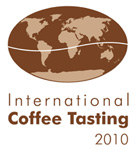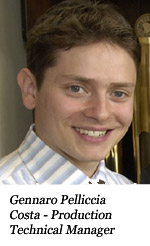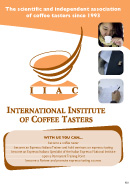International Coffee Tasting 2010: all the winners
 The third edition of International Coffee Tasting, the international coffee contest organized by the International Institute of Coffee Tasters, ended on October 27. For two days, 27 tasters from nine different countries (Italy, Japan, Poland, Slovakia, Slovenia, Sweden, Switzerland, Serbia, Germany) evaluated 121 coffees from Italy, Germany, Mexico, Poland, Slovenia, Spain, Switzerland, Thailand, and the USA.
The third edition of International Coffee Tasting, the international coffee contest organized by the International Institute of Coffee Tasters, ended on October 27. For two days, 27 tasters from nine different countries (Italy, Japan, Poland, Slovakia, Slovenia, Sweden, Switzerland, Serbia, Germany) evaluated 121 coffees from Italy, Germany, Mexico, Poland, Slovenia, Spain, Switzerland, Thailand, and the USA.
The major types of coffee competed for their place: espresso bar, moka, pods, capsules, and filter. All products were prepared by professional baristas and evaluated anonymously by the tasters who recorded their scores on taste cards. These were then processed statistically.
"Espressos of extraordinary elegance are appearing on the coffee scene. Espressos that no longer amaze with a luxurious, full body and oodles of crema but seduce us with an incredible freshness and remarkable aromatic complexity” – commented Luigi Odello, the General Secretary of the International Institute of Coffee Tasters and Professor of Sensory Analysis at several universities in Italy and abroad. "These products certainly represent the cutting edge in the future of high-quality espresso, especially in those countries where espresso is not traditionally consumed”.
“There has also been a considerable improvement in the single-dose coffee sector”, Odello adds. “In fact, now we have pods that allow for the optimal extraction of coffee and innovative capsules, both frequently conceived for restaurant coffee menus”.
The Winners
Italian Blends for Espresso
- Caffè Qualità Oro – La Genovese, Albenga (SV)
- Bar – Caffen, Napoli
- Bar 100% Arabica – Holly Caffè, Città di Castello (PG)
- Caffè Tonino Lamborghini – Officina Gastronomica, Parma (PR)
- Miscela Degustazione – Trismoka, Paratico (BS)
- Cinquestelle – Caffè Cartapani, Brescia
- Extra Bar – Caffè Fantino, Peveragno (CN)
- Superoro – Caffè Cagliari, Modena (MO)
- Oro Oro – Torrefazione Caffè Gran Salvador, Brescia
- Natura Equa Bio Fairtrade – Caffè Agust, Brescia
- Caffè Alberto Miscela Pappagallo Rosso – Taurocaf, Caselle Torinese (TO)
- Caffè Elite Bar 100% Arabica – Italcaffè, La Spezia
- Faraglia Espresso 100% Arabica – Torrefazione Olimpica, S. Rufina Cittaducale (RI)
- Espresso Bendinelli 100% Arabica Gourmet – Caffè Roen, Verona
- Olimpia – Torrefazione Parenti, Bologna
- Noir – Paladini, Borgo San Lorenzo (FI)
- Master Club Coffee – Costadoro, Torino
- Pelourinho 100% Arabica – Magazzini del Caffè, Brescia
- Super Bar – Torrefazione S. Salvador, Villa di Tirano (SO)
- Battistino – Torrefazione Caffè Michele Battista, Triggiano (BA)
Non Italian Single Origins And Blends for Espresso
- Barcaffè Prestige 100% Arabica – Droga Kolinska, Slovenia
- Espresso Single Origin Malawi Mzuzu Geisha Viphya – Adesso, Poland
- P&F Espresso Blend – P&F Coffee Limited, Thailand
- Bizzarri Blend – 100% Arabica Coffee – Caffè Umbria, USA
- Bacio Espresso Miscela Italiana – Bontà, Mexico
- Extra Milano – Massimo Cerutti, Switzerland
- P&F Splendid Espresso Blend – P&F Coffee Limited,Thailand
Single Origins or Blends for Italian Moka
- Oro Oro – Torrefazione Caffè Gran Salvador, Brescia
- Gayo Mountain Sumatra Indonesia – Corsino Corsini, Badia al Pino (AR)
- Caffè Alberto Miscela Espresso Casa 100% Arabica – Taurocaf, Caselle Torinese (TO)
Single Origins or Blends in Pods or Capsules
- Bacio Pods – Bontà, Mexico
- Caffè Morettino 100% Arabica Espresso – Angelo Morettino, Palermo
- Espresso Made In Italy – Caffè Agust, Brescia
- Costadoro Coffee Pod – Costadoro, Torino
- Caffè Roen Cialda Monodose – Caffè Roen, Verona
- Cialda Densacrema – Zicaffè, Marsala (TP)
Single Origins or Blends for Filter Coffee
- Barcaffè Filter 100% Arabica – Droga Kolinska, Slovenia
 What does the coffee market in the UK look like?
What does the coffee market in the UK look like?
